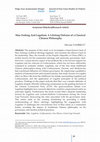Papers by Mevlan Tanrikut

The Journal of East Asian Studies, 2025
The purpose of this study is to investigate a lesser-known facet of Mao Zedong's political ideolo... more The purpose of this study is to investigate a lesser-known facet of Mao Zedong's political ideology-legalism- and examine the effects it had on his leadership. Mao, the founder of the People's Republic of China (PRC), is widely known for his communist ideology and autocratic governance style. However, a lesser-known aspect of his political life is his fervent support for Legalism and his criticism of Confucianism, which has not been sufficiently examined in academic studies. Legalism, one of the four main traditional Chinese philosophies-along with Confucianism, Daoism, and Mohism-has had a profound influence on Chinese governance. By employing a qualitative analysis of historical texts and research articles, this study focuses on Legalist effect on Mao life from the childhood, his debate surrounding Legalism and Confucianism, and the application of Legalist principles in his political practices. Findings on this paper indicates that Mao was a fanatic defender of Legalism despite he officially embraced communism as the guiding doctrine of the Chinese Communist Party (CCP). His quasi-academic debate over Legalism highlights how research objectivity could be compromised under an autocratic regime. Furthermore, the study reveals Mao’s despotic leadership formed by Legalism and Leninist-Stalinist Communism during the Great Leap Forward, showcasing the risks associated with his governance style. This article adds to the existing scholarship by providing a subtle understanding of Mao's ideology, highlighting his engagement with Legalism. It challenges the conventional view of Mao solely as a communist leader, revealing the impact of traditional Chinese philosophy on his governance and modern political practices.

İbn Haldun çalışmaları dergisi, Jul 3, 2023
The Reign of Xi Jinping has been characterized as assertive, unapologetic, and autocratic both at... more The Reign of Xi Jinping has been characterized as assertive, unapologetic, and autocratic both at home and abroad . His strict control over Chinese companies and cracking down on private high-tech companies have become debated. If we look back economic system of the Chinese Communist Party, we will find that state control of the economy has been the primary trend. One might ask, what are the reasons for the Chinese Communist Party, particularly Xi Jinping's sensitiveness to private business, and where has the idea of state monopoly over the private sector originated? By highlighting the importance of the historical approach, rather than a progressive one, for analyzing the statecraft in contemporary China methodologically, the present paper tries to address this question by examining the Discourses on Salt and Iron, a famous classic piece recorded by Huan Kuan of the Han Dynasty (202 BC -220 AD) and its legacy in successive governments. The first part of the paper focuses on the historical background of the Chinese state monopoly, which aims to show the historical event that led to the implementation of monopolistic economic policies and supportive rational arguments for its continuation. The second part sheds light on the continuation of this policy and illustrates how and why this policy is still alive today. By pondering above all, this study argues that China's main concern in the economy is maintaining the power gap between the authority and private merchants, which is the legacy of traditional Chinese statecraft.










Uploads
Papers by Mevlan Tanrikut